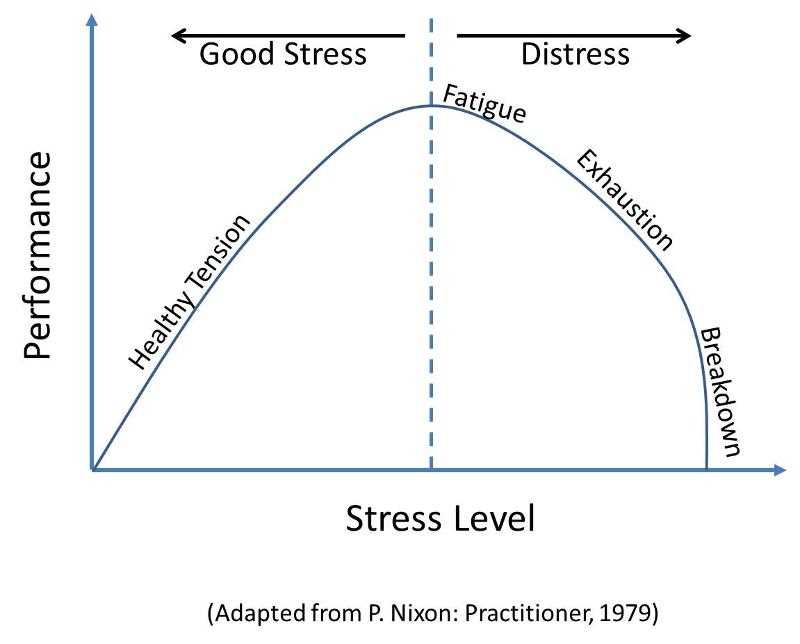
Are you finding it difficult to cope with the stress and challenges of everyday life? Do you feel overwhelmed and unable to manage your emotions effectively? If so, our Stress and Emotional Resilience Course is designed to help you develop the mental well-being skills you need to navigate life’s ups and downs with ease.
Stress is a common experience that can have a significant impact on our emotional and physical health. It can affect our relationships, performance at work, and overall quality of life. However, by learning how to build emotional resilience, we can develop the ability to bounce back from adversity and manage stress in a healthy way.
Our course is specifically designed to provide you with the tools and techniques to enhance your emotional resilience and improve your overall well-being. Through a combination of practical exercises, interactive discussions, and expert guidance, you will learn how to identify and manage stress triggers, develop effective coping strategies, and cultivate a positive mindset.
By building emotional resilience, you will be better equipped to handle life’s challenges, maintain a sense of calm in stressful situations, and protect your mental health. Whether you are facing a difficult period in your personal life or looking to enhance your professional performance, our Stress and Emotional Resilience Course will empower you to take control of your emotions and live a more fulfilling life.
What is Emotional Resilience?
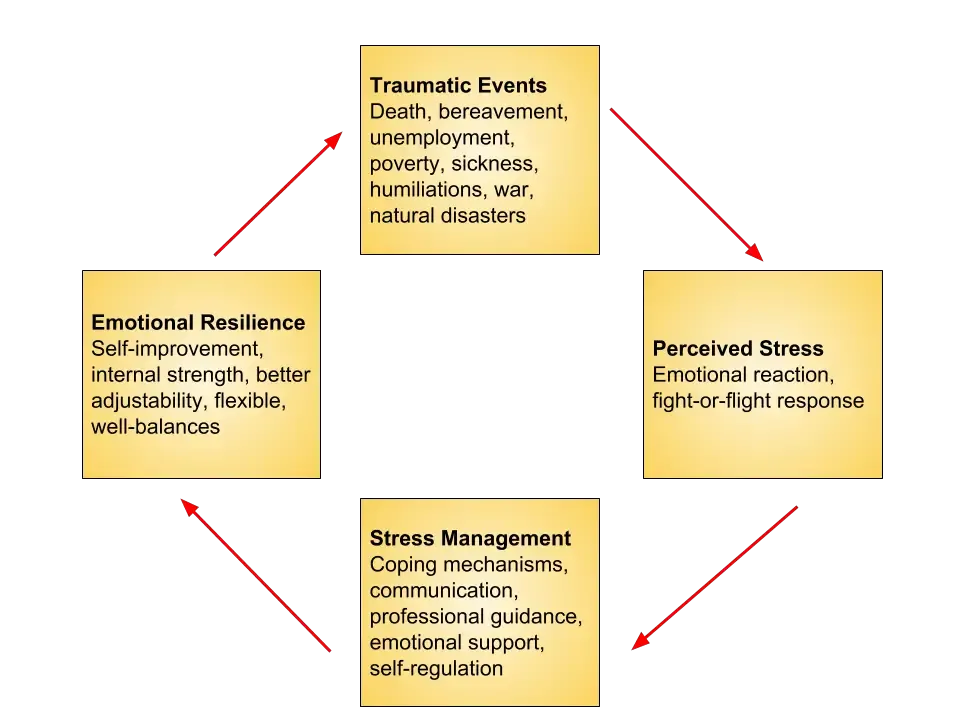
Emotional resilience refers to an individual’s ability to adapt and cope with stress, adversity, and challenging life events. It is a mental health skill that can be learned and developed through various techniques and practices. Our stress and emotional resilience course is designed to help individuals enhance their emotional resilience and improve their overall well-being.
Emotional resilience involves the ability to bounce back from setbacks, maintain a positive outlook, and effectively manage stress. It allows individuals to navigate difficult situations and maintain their mental and emotional health. By building emotional resilience, individuals can develop the skills and strategies necessary to cope with life’s challenges and maintain a balanced and healthy lifestyle.
Our stress and emotional resilience course provides practical tools and techniques to help individuals build their emotional resilience. Through interactive exercises, guided meditation, and cognitive-behavioral therapy techniques, participants will learn how to identify and manage stress triggers, develop healthy coping mechanisms, and enhance their overall well-being.
Emotional resilience is a crucial aspect of mental health and well-being. By developing this skill, individuals can better navigate life’s ups and downs, improve their ability to handle stress, and ultimately lead happier and more fulfilling lives. Whether you are facing a specific challenge or simply want to enhance your overall emotional well-being, our stress and emotional resilience course can provide you with the tools and support you need to thrive.
Understanding the concept of emotional resilience
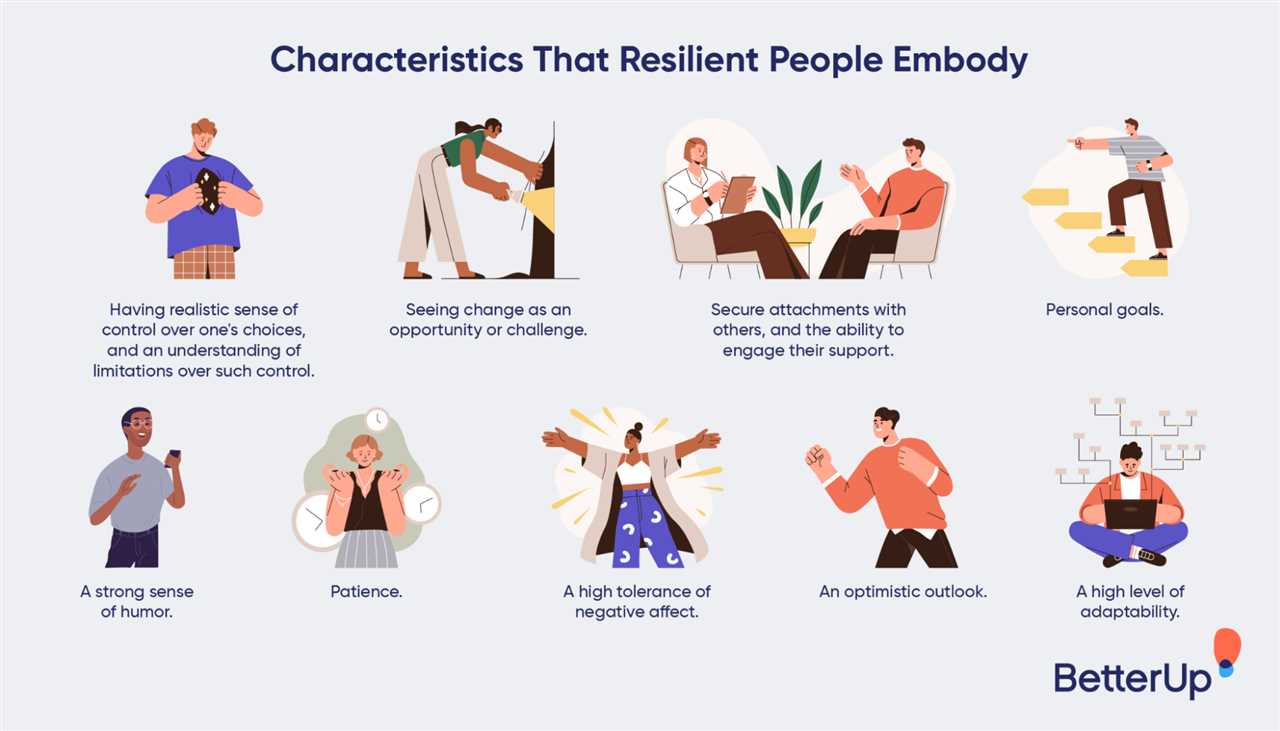
Emotional resilience is a crucial skill for maintaining well-being in today’s fast-paced and demanding world. It refers to the ability to adapt and bounce back from stressful situations, setbacks, and challenges. This skill is important for both our emotional and mental health, allowing us to cope with and manage stress effectively.
Emotional resilience is not about avoiding stress or difficult emotions, but rather about developing the skills and mindset to navigate them in a healthy way. It involves recognizing and understanding our own emotions, as well as being able to regulate them in order to maintain a sense of balance and well-being.
By building emotional resilience, we can develop a greater capacity to handle stress and adversity, which can lead to improved mental health and overall well-being. This course on stress and emotional resilience aims to provide individuals with the tools and strategies to enhance their emotional resilience skills.
Throughout the course, participants will learn various techniques for managing stress, such as relaxation exercises, mindfulness practices, and cognitive restructuring. They will also explore the importance of self-care and develop strategies for building resilience in their daily lives.
By understanding the concept of emotional resilience and developing the necessary skills, individuals can better navigate the challenges and stressors they may encounter, leading to improved overall well-being and a greater ability to cope with life’s ups and downs.
The importance of emotional resilience in managing stress
Emotional resilience plays a crucial role in maintaining our overall health and well-being. It is the ability to adapt and cope with life’s challenges, including stress, in a healthy and positive way. In today’s fast-paced and demanding world, managing stress has become an essential skill for maintaining mental and emotional balance.
Stress is a normal part of life, and everyone experiences it to some degree. However, prolonged or chronic stress can have detrimental effects on our mental and physical health. It can lead to anxiety, depression, sleep problems, and a weakened immune system. This is where emotional resilience comes in.
Emotional resilience helps us bounce back from stressful situations and prevents stress from taking a toll on our mental well-being. It allows us to adapt to change, overcome obstacles, and maintain a positive outlook even in the face of adversity. By developing emotional resilience, we can better manage stress and protect our mental health.
One way to cultivate emotional resilience is through education and practice. Taking a stress and emotional resilience course can provide valuable tools and techniques for managing stress effectively. These courses teach strategies such as mindfulness, cognitive reframing, and self-care practices that can help build emotional resilience and improve coping skills.
By investing in our emotional resilience, we can enhance our ability to handle stress and protect our mental health. It enables us to maintain a balanced and positive mindset, even in challenging times. So, if you want to learn how to build emotional resilience and manage stress, consider enrolling in a stress and emotional resilience course today.
What is Stress?
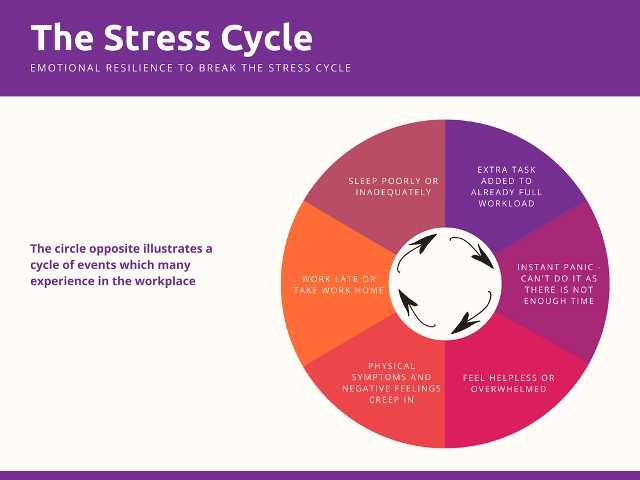
Stress is an emotional and mental response to challenging or overwhelming situations. It is a natural reaction that can affect our physical, mental, and emotional well-being. Stress can be caused by various factors such as work pressure, relationship issues, financial problems, or health concerns.
Our Stress and Emotional Resilience course is designed to help individuals develop coping skills and strategies to manage stress effectively. By learning how to build emotional resilience, participants can improve their overall mental health and well-being.
Stress can have a negative impact on both our physical and mental health. It can lead to symptoms such as headaches, fatigue, irritability, difficulty concentrating, and sleep disturbances. Chronic stress can also increase the risk of developing various health conditions, including heart disease, depression, and anxiety disorders.
By participating in our stress and emotional resilience course, individuals can learn valuable skills to manage stress and improve their overall health and well-being. The course covers topics such as stress management techniques, relaxation exercises, mindfulness practices, and effective communication strategies.
Building emotional resilience is an essential part of managing stress. It involves developing the ability to bounce back from difficult situations and adapt to change. By strengthening emotional resilience, individuals can better cope with stress and maintain a positive outlook on life.
Overall, our stress and emotional resilience course provides individuals with the tools and knowledge they need to effectively manage stress and improve their overall mental health and well-being. By learning how to build emotional resilience and develop coping skills, participants can lead happier, healthier lives.
Defining stress and its impact on mental and physical health
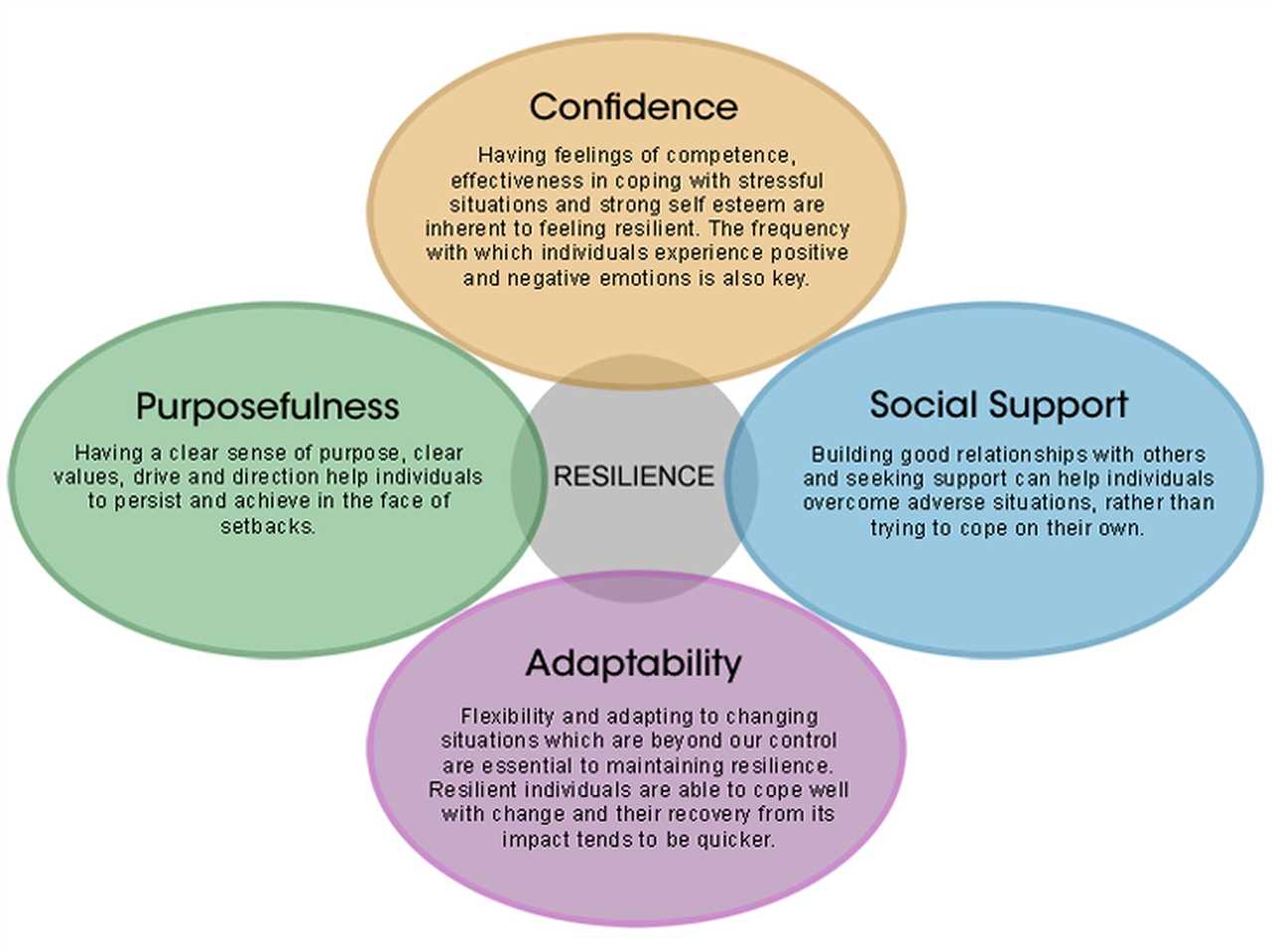
Stress is a common experience that affects individuals in various ways. It can be defined as a physiological and psychological response to external and internal pressures or demands. This response can be triggered by different factors, such as work-related challenges, personal relationships, financial difficulties, or major life events.
When individuals are exposed to stress, it can have a significant impact on their mental and physical health. It can lead to a range of symptoms and conditions, including anxiety, depression, insomnia, headaches, digestive problems, and weakened immune system.
However, it is important to note that stress is not always negative. In fact, a certain level of stress can be beneficial, as it can motivate individuals to perform better and overcome challenges. This is where emotional resilience comes into play.
Emotional resilience refers to an individual’s ability to cope with and adapt to stressful situations. It involves the capacity to bounce back from setbacks, maintain a positive outlook, and effectively manage emotions. Developing emotional resilience is crucial for maintaining mental and physical well-being.
Our Stress and Emotional Resilience Course is designed to help individuals understand and manage stress effectively. By learning various coping strategies and techniques, participants will be able to build emotional resilience and improve their overall health and well-being.
Identifying common stressors in daily life
Stress is a common experience in daily life that can have a significant impact on our well-being and emotional resilience. It is important to identify the common stressors that we encounter in order to effectively manage and cope with them.
One common stressor is work-related stress. The demands of our jobs, such as tight deadlines, long hours, and high expectations, can lead to increased stress levels. It is important to develop skills to manage work-related stress, such as time management and setting boundaries.
Another common stressor is financial stress. Money-related issues, such as debt, unemployment, or unexpected expenses, can cause significant stress. Developing financial literacy and budgeting skills can help alleviate some of the stress associated with financial difficulties.
Relationships can also be a source of stress. Conflicts, misunderstandings, and lack of communication can all contribute to relationship stress. Developing effective communication and conflict resolution skills can help improve relationships and reduce stress.
Health-related stressors, such as illness, chronic pain, or caregiving responsibilities, can also have a significant impact on our emotional well-being. It is important to prioritize self-care and seek support from healthcare professionals or support groups when needed.
Finally, external factors such as major life changes, like moving, divorce, or loss of a loved one, can cause significant stress. Developing resilience and coping skills can help navigate these challenges and maintain emotional well-being.
By identifying these common stressors in daily life, we can take proactive steps to manage and cope with stress. Our stress and emotional resilience course can provide you with the necessary skills and strategies to build emotional resilience and improve your overall well-being.
Building Emotional Resilience
Emotional resilience is a crucial skill for maintaining good mental health and managing stress. It refers to an individual’s ability to adapt and bounce back from difficult situations and emotions. Developing emotional resilience can greatly improve overall well-being and help individuals navigate through life’s challenges.
Our Stress and Emotional Resilience Course is designed to teach you the necessary skills to build emotional resilience and effectively manage stress. Through a combination of theoretical knowledge and practical exercises, this course will empower you to develop a strong foundation of emotional resilience.
The course covers various strategies and techniques that can be used to enhance emotional resilience. These include:
| Self-awareness | Understanding your own emotions and triggers is essential for building emotional resilience. This course will guide you through exercises and activities that promote self-reflection and self-awareness. |
| Emotional regulation | Learning how to effectively manage and regulate your emotions is a key aspect of emotional resilience. The course will provide you with practical tools and techniques to better control your emotional responses. |
| Positive thinking | Developing a positive mindset can significantly improve emotional resilience. This course will teach you strategies to cultivate positive thinking patterns and overcome negative thoughts. |
| Stress management | Effective stress management is crucial for building emotional resilience. The course will provide you with a range of stress reduction techniques and coping strategies. |
| Building support networks | Having a strong support system can greatly enhance emotional resilience. This course will guide you on how to build and maintain supportive relationships. |
By completing our Stress and Emotional Resilience Course, you will gain the necessary knowledge and skills to build emotional resilience and effectively manage stress. Investing in your emotional well-being is essential for maintaining good mental health and overall well-being.

I am Patrina de Silva, a psychologist and mental health blogger in Sri Lanka. After obtaining psychology degrees from the University of Colombo and Monash University, I returned home to work as a counselor while also starting the popular blog “Pressy but Happy” to provide advice on psychological issues. Over the past decade, my empathetic articles have made my blog a leading mental health resource in the country. In addition to writing, I maintain a private therapy practice, frequently volunteer counseling time, and conduct seminars, driven by my passion for destigmatizing mental illness and educating the public on the mind-body connection. I strive to be an influential voice in my field through my compassionate approach.
